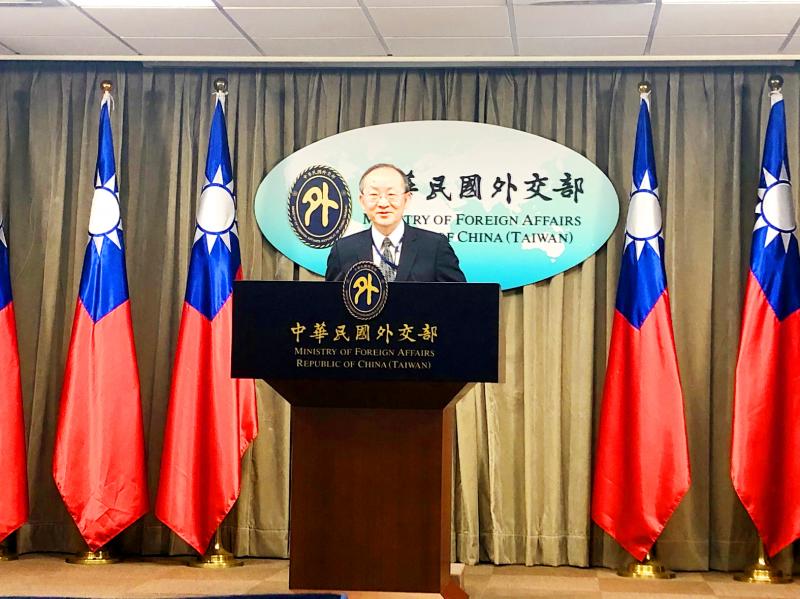Taiwan warned the WHO and China about possible human-to-human transmission of the new coronavirus at the end of last year, but the global health body did not make it public, the Ministry of Foreign Affairs said yesterday.
Department of International Organizations Director-General Bob Chen (陳龍錦) made the remark at a news briefing in Taipei, when asked about statements made by US Department of State spokeswoman Morgan Ortagus.
“Dec. 31— that’s the same day Taiwan first tried to warn WHO of human-human transmission. Chinese authorities meanwhile silenced doctors and refused to admit human-human transmission until Jan. 20, with catastrophic consequences,” Ortagus wrote on Twitter yesterday.

Photo: Lu Yi-hsuan, Taipei Times
Her tweet was in response to a post by Chinese Ministry of Foreign Affairs spokeswoman Hua Chunying (華春瑩), who wrote that the Wuhan Municipal Health Commission had issued a notice about the virus on Dec. 31 last year.
The commission’s notice reported 27 cases, including seven severe ones, in Wuhan, but said that no obvious transmission among people had been observed.
The Centers for Disease Control on Dec. 31 last year did ask China and the WHO’s International Health Regulations contact for information about the abnormal outbreak of pneumonia in Wuhan, while the ministry’s representative office in Geneva, Switzerland, also contacted the WHO secretariat, Chen said.
On the same day, the centers started implementing onboard inspections on direct flights from Wuhan landing in Taiwan, he said.
The WHO later replied that it received the message and would transfer it to other experts, but did not make it public, he said.
There are e-mail records of the communication between the centers and the WHO, he added.
Taiwan’s disease prevention strategy was predicated on the concept that the virus could be transmitted among people, ministry spokeswoman Joanne Ou (歐江安) said.
The nation thanks the US and other like-minded nations for their support, and would work with the global community to contain the virus, she said.
Meanwhile, the WHO secretariat is still evaluating whether to convene the 73rd session of the World Health Assembly from May 17 to 21, turn it into a virtual meeting or postpone it until autumn, Chen said.
Although it is almost impossible for WHO Director-General Tedros Adhanom Ghebreyesus to invite Taiwan to join the assembly as an observer, the ministry would continue to push for Taiwan’s participation in the meeting, he said.
In other developments, British Secretary of Foreign and Commonwealth Affairs Dominic Raab has advised all Britons who are usually based in the UK to return home soon, given the rapidly changing situation regarding travel restrictions and flights, the British Office Taipei said in a statement.
The advice does not apply to Britons who are residents in Taiwan.

The CIA has a message for Chinese government officials worried about their place in Chinese President Xi Jinping’s (習近平) government: Come work with us. The agency released two Mandarin-language videos on social media on Thursday inviting disgruntled officials to contact the CIA. The recruitment videos posted on YouTube and X racked up more than 5 million views combined in their first day. The outreach comes as CIA Director John Ratcliffe has vowed to boost the agency’s use of intelligence from human sources and its focus on China, which has recently targeted US officials with its own espionage operations. The videos are “aimed at

STEADFAST FRIEND: The bills encourage increased Taiwan-US engagement and address China’s distortion of UN Resolution 2758 to isolate Taiwan internationally The Presidential Office yesterday thanked the US House of Representatives for unanimously passing two Taiwan-related bills highlighting its solid support for Taiwan’s democracy and global participation, and for deepening bilateral relations. One of the bills, the Taiwan Assurance Implementation Act, requires the US Department of State to periodically review its guidelines for engagement with Taiwan, and report to the US Congress on the guidelines and plans to lift self-imposed limitations on US-Taiwan engagement. The other bill is the Taiwan International Solidarity Act, which clarifies that UN Resolution 2758 does not address the issue of the representation of Taiwan or its people in

US Indo-Pacific Commander Admiral Samuel Paparo on Friday expressed concern over the rate at which China is diversifying its military exercises, the Financial Times (FT) reported on Saturday. “The rates of change on the depth and breadth of their exercises is the one non-linear effect that I’ve seen in the last year that wakes me up at night or keeps me up at night,” Paparo was quoted by FT as saying while attending the annual Sedona Forum at the McCain Institute in Arizona. Paparo also expressed concern over the speed with which China was expanding its military. While the US

SHIFT: Taiwan’s better-than-expected first-quarter GDP and signs of weakness in the US have driven global capital back to emerging markets, the central bank head said The central bank yesterday blamed market speculation for the steep rise in the local currency, and urged exporters and financial institutions to stay calm and stop panic sell-offs to avoid hurting their own profitability. The nation’s top monetary policymaker said that it would step in, if necessary, to maintain order and stability in the foreign exchange market. The remarks came as the NT dollar yesterday closed up NT$0.919 to NT$30.145 against the US dollar in Taipei trading, after rising as high as NT$29.59 in intraday trading. The local currency has surged 5.85 percent against the greenback over the past two sessions, central